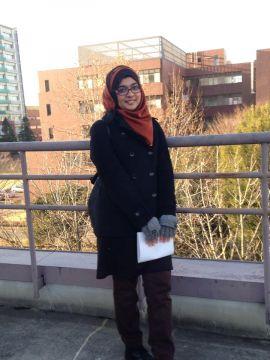Academics
Student Voice: Learn Japanese
Language leads to an immersive cultural experience
Japanese classes expand opportunities for English-language students at the University of Tsukuba
Amin Tanzila arrived at the University of Tsukuba in 2013 as a 19-year-old from Bangladesh, knowing barely a word of Japanese. Just two years later, she has fallen in love with the language, becoming so proficient that she has performed in and helped direct a Japanese-speaking student film ? a short comedy about a cheating student who does not study.
Fortunately, life does not imitate art, Tanzila notes with a laugh. Like all non-Japanese-speaking students in the University of Tsukuba's English-language program, she was required to take courses in basic Japanese when she embarked on her main area of study? biology.
These requisite Japanese lessons do not teach the language as an academic pursuit, explains the interim coordinator for Japanese Language Training for the University of Tsukuba's English-language program, Associate Professor Cade Bushnell.
"We focus on helping students develop functional language skills, because even though their degree program is taught in English and there are many people in administration who can help them in English, everything outside of the university is Japanese," says Bushnell. "We want the students to be able to participate in life in Japan; not just within their program, but more broadly."
The University of Tsukuba has always had international students. In the past, however, if they arrived to study without language skills they had to attain some proficiency in Japanese before commencing their main field of study. Special language training programs like the one offered at the University of Tsukuba began in 2010 in universities across the country, subsidized by the Japanese Government. When that funding finished, individual universities had to decide whether to continue these programs.
"In the case of the University of Tsukuba, we decided to continue and expand it as part of efforts to globalize the university," says Bushnell. The program presently has about 400 students from all over the world, with about 15 students per class. All English-speaking students are expected to study Japanese, unless they can already speak Japanese.
Most attain the course credits they require during their first year. For some that is enough: they are happy just to undertake the basic language classes ? finding they provide sufficient Japanese to get around outside the university. However, most ? Bushnell estimates about 70% ? opt for further, more advanced, Japanese classes, adding these to their main areas of study.
"They want to expand into learning how to read and write also," Bushnell explains. "As well as the Japanese-language courses we also have courses called Japanese Issues that are taught in English." These cover topics on Japanese culture, society, history and geography.
Tanzila found those first compulsory language classes essential to helping her fit quickly into life in Japan. But she soon realized that learning the basics was not going to be enough for her. She decided to continue with both Japanese language and culture classes, the credits from which she is able to use to supplement the undergraduate biology degree she is presently taking.
"And now I'm thinking that if I become really good at the Japanese language that I'll stay on here, even after I graduate," Tanzila says. "I'm also now considering taking a master's course here in an area of biology and maybe even working here later."
Loving language: Amin Tanzila arrived at the University of Tsukuba from Bangladesh, knowing barely a word of Japanese, but after free lessons through the university's Japanese Language Training program, she soon became proficient in Japanese.

Related Contents


